Exeter Marine news archive: 2016-2023
_feature.jpg)
Killer whale mums pay high price for raising sons
Raising sons is an exhausting experience that leaves killer whale mothers far less likely to produce more offspring, new research shows.
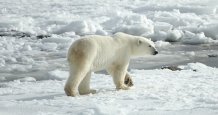
New bid to protect Central Arctic Ocean
Researchers and an Arctic explorer are working together to protect the ocean that surrounds the North Pole.
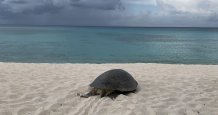
Project aims to shield Cayman Islands turtles from climate change threats
Researchers are investigating how to protect sea turtles in the Cayman Islands from the multiple threats caused by climate change.

Plastic pollution kills sea urchin larvae
Sea urchin larvae raised in high levels of plastic pollution die due to developmental abnormalities, new research shows.
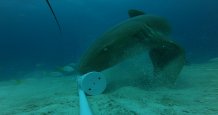
Underwater footage reveals sharks’ flexible feeding skills
Underwater cameras have revealed the impressive range of skills nurse sharks use when feeding.
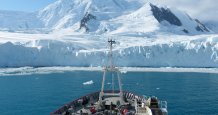
Underwater tsunamis created by glacier calving cause vigorous ocean mixing
Scientists on a research vessel in Antarctica watched the front of a glacier disintegrate and their measurements “went off the scale”.
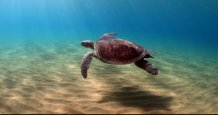
Egyptian lagoon vital to Cyprus turtles
The number of green turtles breeding in Cyprus has risen in recent years – but this bounce-back depends heavily on an Egyptian lagoon where many turtles feed, new research shows.
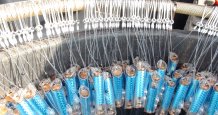
Electric pulses save sharks from fishing hooks
Gadgets that emit small electrical pulses can drastically cut the number of sharks and stingrays caught accidentally on fishing lines, new research shows.
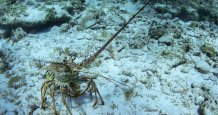
Sustainable fishing plan for Caribbean spiny lobsters
A new project will help to ensure sustainable fishing and aquaculture (fish farming) of Caribbean spiny lobsters.
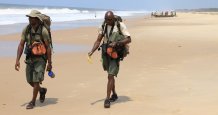
Congo creates first Marine Protected Areas
The Republic of the Congo has created its first ever Marine Protected Areas (MPAs), supported by a research team including the University of Exeter and the Wildlife Conservation Society.
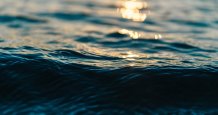
£3 million for new carbon capture project and pilot plant
A new carbon capture project could pave the way for large-scale removal of carbon dioxide (CO₂) from the atmosphere using the ocean.
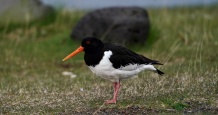
How the mystery of the missing oystercatcher tag was finally solved
Exeter researchers will soon be able to redeploy an electronic tag used to monitor migrating oystercatchers, which went missing on Orkney before mysteriously transmitting signals from a campsite, tourist attractions and a pizza restaurant.
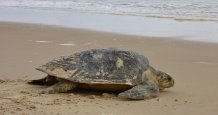
Research reveals true extent of sea turtle conservation success
The true extent of how successful conservation efforts to protect sea turtle populations along the western coast of Central Africa have been revealed in a new study.
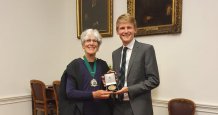
Exeter doctoral student wins prestigious medal for "extraordinary" research
A prestigious medal for the UK’s best PhD thesis in biology has been awarded to Dr Timothy Lamont, for his PhD work at the University of Exeter.
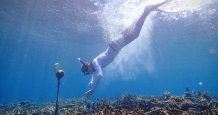
AI learns coral reef "song"
Artificial Intelligence (AI) can track the health of coral reefs by learning the "song of the reef", new research shows.
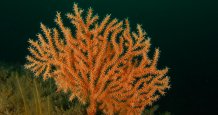
British coral predicted to be resilient to climate change
An iconic coral species found in UK waters could expand its range due to climate change, new research shows.

'Make or break' year for protecting nature
2022 is a "make or break" year for protecting nature and tackling climate change, a leading scientist says.
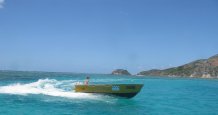
'Traffic calming' boosts breeding on coral reefs
Coral reef fish breed more successfully if motorboat noise is reduced, new research shows.
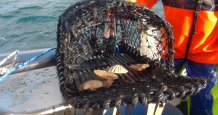
Scallops swim into illuminated fishing pots
Scallops are drawn to illuminated fishing pots like moths to a flame, new research shows.
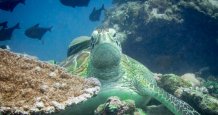
Sea turtle success stories along African east coast – but thousands still dying
Conservation of sea turtles along Africa's east coast has made good progress – but tens of thousands still die each year due to human activity, researchers say.
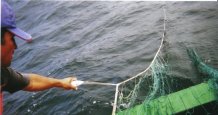
Peru "pinger" trial deters dolphins but not whales
A trial of underwater sound devices called pingers reduced the number of dolphins caught in fishing nets – but did not deter humpback whales.
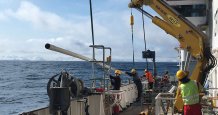
Research ship delves into ocean history
A research ship is taking seabed samples from the North Sea and North Atlantic to find out what the oceans were like before major changes caused by humans.
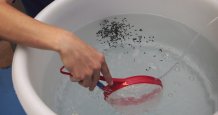
Marine-i helps National Lobster Hatchery to develop an innovation to improve lobster stocks
Marine-i is supporting the National Lobster Hatchery to develop a new kind of larval rearing vessel.
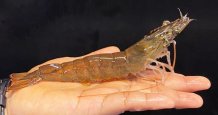
Multi-million funding for new 'terrestrial blue economy' research
A pioneering new research project, designed to unlock the true potential of sustainable shrimp production in the UK using renewable energy technology, has received a multi-million pound funding boost.
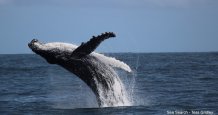
'Whup' and 'grumble' calls reveal secrets of humpback whales
Sounds made by humpback whales – including a previously unknown call – have given researchers a glimpse of their lives in the high seas.
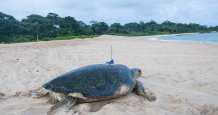
African network protects key turtle sites
A network of West African Marine Protected Areas (MPAs) covers key sites used by green turtles, new research shows.
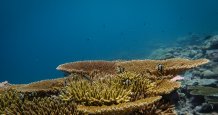
Remote Indian Ocean reefs bounce back quickly after bleaching
Coral reefs in remote or protected areas can recover quickly after mass coral bleaching events, new research shows.
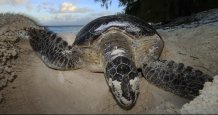
Half century of protection pays off for sea turtles
Green turtle numbers continue to rise on a group of islands where the species has now been protected for more than 50 years, new research shows.

Plastic labelling needs 'sustainability scale'
Labelling of plastic products needs a drastic overhaul including a new "sustainability scale" to help consumers, researchers say.
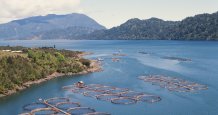
Bid to protect "blue food" revolution
Scientists have developed a new way to identify and reduce the impact of chemicals and diseases in global aquaculture (fish farming).
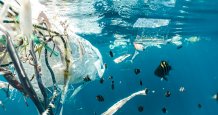
Leading UK marine scientists welcome move towards global plastics pact ahead of major UN meeting
Plastic pollution is universally accepted as having dire effects on the world’s marine life and ecosystems, in addition to presenting risks to human health including through the leaching of chemical additives and consumption of microplastics contained in seafood
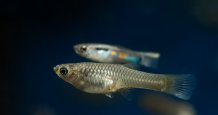
'Freeze or flee' reactions run in fish families
Families of fish tend to share similar reactions to stressful situations, new research shows.
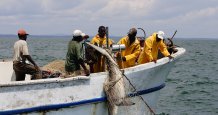
Gabon provides blueprint for protecting oceans
Gabon's network of Marine Protected Areas (MPAs) provides a blueprint that could be used in many other countries, experts say.

Councils urged to sign 'motion for the ocean'
UK councils are being urged to sign a "motion for the ocean" – pledging to engage with citizens to promote ocean recovery.
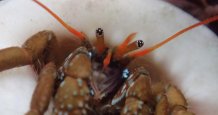
English Channel stops new rockpool species reaching UK
The English Channel prevents many rockpool species "making the jump" from Europe to the UK, new research shows.

Fish study shows role of oestrogens in sense of smell
Steroid oestrogens play an important role as embryos develop a sense of smell, new research shows.
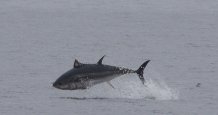
Bluefin tuna tagged for the first time in UK waters with acoustic ‘residency’ tags
Bluefin tuna have been tagged with state-of-the-art acoustic tracking tags for the first time in UK waters.
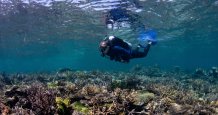
Newly discovered fish songs demonstrate reef restoration success
Whoops, croaks, growls, raspberries and foghorns are among the sounds that demonstrate the success of a coral reef restoration project.
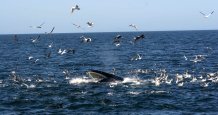
Big-city coastal whales consume millions of microplastics every day
Whales in New Zealand's Hauraki Gulf consume about three million microplastics per day, a new study has found.
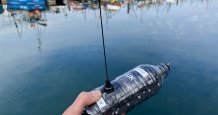
COP26: Plastic pollution trackers released off Scotland
On the penultimate day of COP26, scientists have deployed plastic pollution tracking devices into the ocean around Scotland.
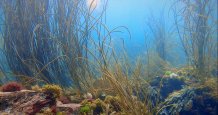
Convex launches Seascape Survey Partnership with Blue Marine Foundation
Convex Group Limited (Convex) today announces a multi-million-dollar partnership with the Blue Marine Foundation (BLUE), a charity dedicated to restoring the ocean to health, and the University of Exeter and its foremost researchers, with the launch ofthe Convex Blue Carbon Seascape Survey.

Artificial Intelligence could help predict harmful algal blooms
A new project will develop Artificial Intelligence tools to predict harmful blooms of algae in the ocean.
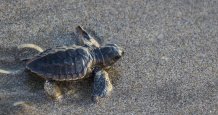
Plastic creates 'evolutionary trap' for young sea turtles
Plastic pollution creates an "evolutionary trap" for young sea turtles, new research shows.
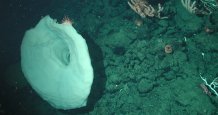
Warning over start of commercial-scale deep-sea mining
Deep-sea mining in international waters could begin in two years – but researchers say this is unnecessary and could cause irreversible damage to marine ecosystems.
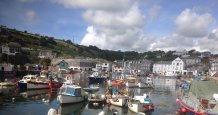
Major research initiative to support marine economy deal with future shocks
A new research programme will investigate and strengthen the resilience, wellbeing and sustainability of UK coastal communities.
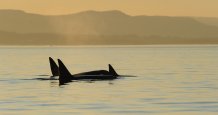
New evidence of menopause in killer whales
Scientists have found new evidence of menopause in killer whales – raising fascinating questions about how and why it evolved.

Marine 'identity' could boost ocean protection
Many people are so attached to the ocean that it forms a key part of their identity, new research suggests.
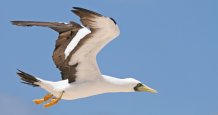
Seabird colony creates 'halo' of depleted fish stocks
A vast seabird colony on Ascension Island creates a "halo" in which fewer fish live, new research shows.
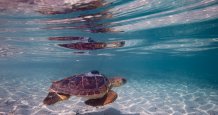
Turtle's tale reveals dual fishing threat
The story of a turtle caught twice in fishing nets reveals a dual threat facing many ocean animals.
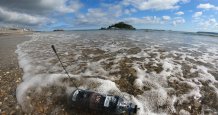
Plastic project launches bottle for each G7 nation
On World Ocean Day, June 8, a collaboration of scientific institutions and ocean groups from around the world will launch scientific monitoring devices into the ocean.
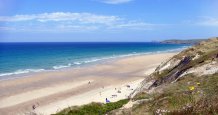
South West scores 65 out of 100 for ocean health
South West England has scored 65 out of 100 for ocean health, a new report reveals.

Study pinpoints key causes of ocean circulation change
Researchers have identified the key factors that influence a vital pattern of ocean currents.
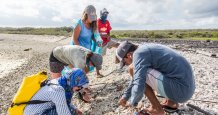
Plastic in Galapagos seawater, beaches and animals
Plastic pollution has been found in seawater, on beaches and inside marine animals at the Galapagos Islands.
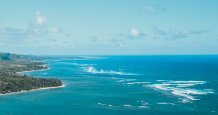
G7 ministers must 'listen to the science'
G7 ministers meeting this week must "listen to the science" and protect the world's ocean, according to researchers and conversation organisations.
_feat_218x115.jpg)
Study uncovers drivers of fishers' decisions of where to fish
A team of researchers from ZSL’s Institute of Zoology and the University of Exeter, alongside Oceanswell, have used a new approach to understand the movement and drivers of commercial fishing fleet activity in one of the world’s most over-exploited oceans.
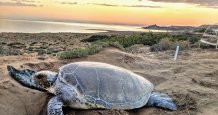
Mediterranean turtles recovering at different rates
Numbers of two Mediterranean turtle species have risen in the last three decades – but in Cyprus the recoveries are happening at different rates, new research shows.
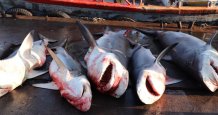
Sharks in protected area attract illegal fishers
Thousands of sharks have been illegally caught in a Marine Protected Area (MPA) in the Indian Ocean, new research shows.
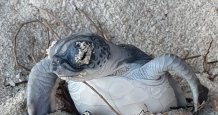
Cayman Islands sea turtles back from the brink
Sea turtles in the Cayman Islands are recovering from the brink of local extinction, new research shows.
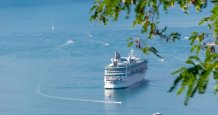
Ship traffic dropped during first months of Covid pandemic
Ship movements on the world's oceans dropped in the first half of 2020 as Covid-19 restrictions came into force, a new study shows.

Exeter ranked 63rd in the world in Times Higher Education Impact Rankings
The University of Exeter’s commitment to sustainability and tackling inequality on the global stage has been recognised in the latest influential rankings.
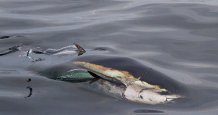
UK waters are home again to the bluefin tuna
Atlantic bluefin tuna have returned to UK waters and can once again be seen during the summer and autumn months.
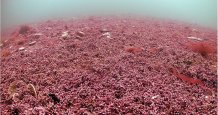
Scientists discover unique Cornish 'falgae'
Red algae that grow in Cornwall's Fal Estuary are genetically unique, new research shows.
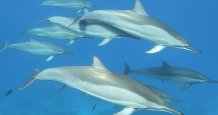
Ocean's mammals at crucial crossroads
The ocean’s mammals are at a crucial crossroads – with some at risk of extinction and others showing signs of recovery, researchers say.
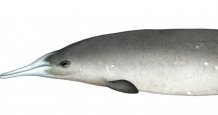
Gray’s beaked whales 'resilient' to ecosystem changes
An elusive whale species in the Southern Ocean could be resilient to near-future ecosystem changes, according to a new study by the universities of Exeter and Copenhagen.
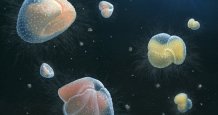
Evolution of ocean 'twilight zone' creatures linked to global climate change
A team led by scientists from Cardiff University has, for the first time, been able to track the development of the largest and least understood habitat on Earth.
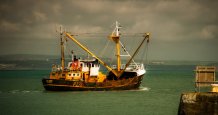
Fishers at risk in 'perfect storm'
Stormier weather will increasingly force fishers to choose between their safety and income, researchers say.

€4 million project uses cutting-edge technology to enhance the habitats of key fish species
A cross-Channel partnership will use innovative underwater acoustic tracking technology to identify the environmental conditions a range of important marine species need in order to thrive.

Rarest seal breeding site discovered
Scientists have discovered a previously unknown breeding site used by the world's rarest seal species.
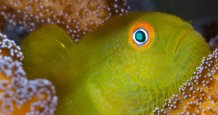
Family ties explain mysterious social life of coral gobies
The strange social structure of tiny fish called emerald coral gobies may be explained by family loyalty, new research shows.
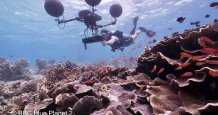
Healthy oceans need healthy soundscapes
Oceans were once filled with the sounds of nature, but overfishing, climate change and human noise have fundamentally changed the natural underwater "soundtrack", researchers say.
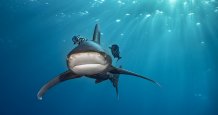
Ocean sharks and rays threatened with extinction
Three quarters of ocean shark and ray species face an elevated risk of extinction, according to new research.
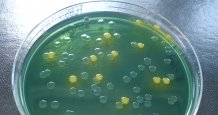
Breakthrough in understanding 'tummy bug' bacteria
Scientists have discovered how bacteria commonly responsible for seafood-related stomach upsets can go dormant and then "wake up".
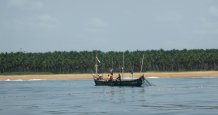
Ivory Coast creates first Marine Protected Area
Ivory Coast has announced the creation of its first Marine Protected Area (MPA).
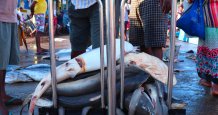
Shark fishing bans partially effective
Bans on shark fishing are only partially effective in protecting sharks, new research suggests.

'Message in a bottle' tracks plastic pollution
Electronic tags released in the Ganges river show plastic pollution can travel thousands of kilometres in just a few months.
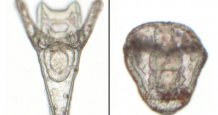
Plastic contaminants harm sea urchins
Plastics in the ocean can release chemicals that cause deformities in sea urchin larvae, new research shows.
_and_marine_(bottom)_sticklebacks_feat_218x115.jpg)
Stickleback study reveals 'parallel' evolution
Animal species in different parts of the world can evolve in "parallel" in response to similar conditions, according to a new study of fish.
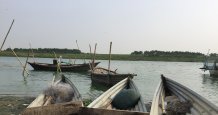
Waste fishing gear threatens Ganges wildlife
Waste fishing gear in the River Ganges poses a threat to wildlife including otters, turtles and dolphins, new research shows.
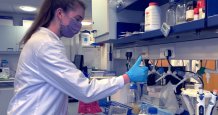
Bacteria and 3D printers could help restore coral reefs
A team of University of Exeter students are using genetically engineered bacteria to produce a material that could help repair degraded coral reefs.
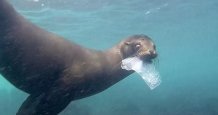
Pacific project will build a circular economy to target plastic pollution
Scientists aim to tackle plastic pollution in the Galapagos Islands and wider Eastern Pacific in a major project based on cooperation with local researchers and communities.
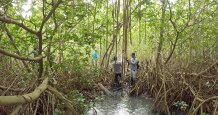
New research identifies ‘triple trouble’ for mangrove coasts
Some of the world’s most valuable ecosystems are facing a "triple threat" to their long-term durability and survival, new research shows.

Join expert discussion on saving the oceans
Scientists specialising in the marine environment will answer questions on ocean conservation during a free online event organised by the University of Exeter.

Exeter-trained scientist honoured in Peru
A scientist trained at the University of Exeter has won Peru’s highest award for conservation.
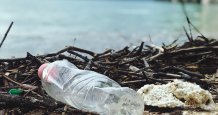
Project to investigate Southeast Asia plastic pollution
Researchers have launched an ambitious project to discover the impacts of plastic pollution in the oceans of Southeast Asia – and how the problem might be tackled.
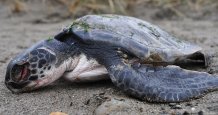
Mystery over decline in sea turtle sightings
The number of sea turtles spotted along the coasts of the UK and Ireland has declined in recent years, researchers say.

Project aims to reveal the fate of tyre particles in the marine environment
The new study aims to assess an until now hidden form of marine litter and show the effects it could have on our seas
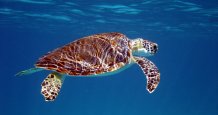
New study reveals migratory habits of teenage green turtles
Researchers and conservationists who have been tracking turtle migration for over a decade believe a new study highlights the need for investment and conservation of vital marine habitats which play a key role in turtle’s formative years.
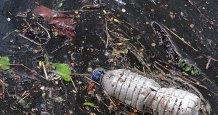
‘Critical’ questions over disease risks from ocean plastics
Key knowledge gaps exist in our understanding of how ocean microplastics transport bacteria and viruses – and whether this affects the health of humans and animals, researchers say.
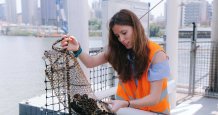
Seafood study finds plastic in all samples
A study of five different seafoods has found traces of plastic in every sample tested.
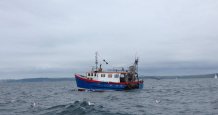
How fish stocks will change in warming seas
New research out today highlights the future effects of climate change on important fish stocks for south-west UK fisheries.
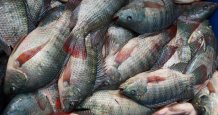
Designing a sustainable future for aquaculture, the world’s fastest growing food sector – A One Health approach
Seafood is one of the fastest-growing and highly traded food markets.
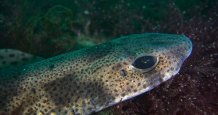
Plastics found in sea-bed sharks
Microplastics have been found in the guts of sharks that live near the seabed off the UK coast.

Penryn student receives prestigious award for her work on tackling plastic waste
A University of Exeter postgraduate student has been honoured with The Diana Award - the highest accolade a young person can achieve for social action or humanitarian efforts.
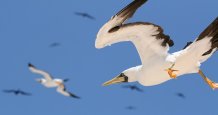
Darwin grants for Exeter research
Three marine conservation projects involving University of Exeter scientists have been awarded funding by the UK government’s Darwin Initiative.
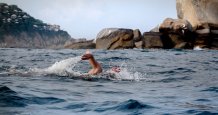
Sea swimming linked to illness, study shows
People who go in the sea are more likely to experience symptoms of illness compared to non-bathers.

Sustainable plastics vital for greener world
Creating sustainable plastics is vital for the future of our environment, a new report says.
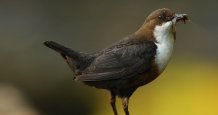
Scientists find first evidence of microplastics passing from insects to predators in rivers
A species of river bird is swallowing hundreds of plastic fibres every day via their insect prey, research by Cardiff University and the Greenpeace Research Laboratories at the University of Exeter has shown.

Are we underestimating microplastics in the marine environment?
A new study suggests an underestimation of microplastics in the ocean.
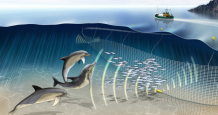
‘Pingers’ could save porpoises from fishing nets
Underwater sound devices called “pingers” could be an effective, long-term way to prevent porpoises getting caught in fishing nets with no negative behavioural effects, newly published research suggests.
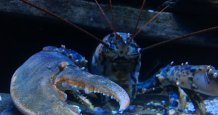
New test identifies lobster hybrids
Scientists have developed a test that can identify hybrids resulting from crossbreeding between European and American lobsters.
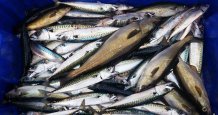
Predicting the future Fish of the Day: How well do our models work?
Understanding how the physical and biological world reacts to climate change is a challenge that science must contend with.

Learn from past to protect oceans
History holds valuable lessons – and stark warnings – about how to manage fisheries and other ocean resources, a new study says.
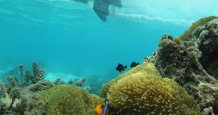
Vexing Nemo: motorboat noise makes clownfish stressed and aggressive
Hormonal changes caused by motorboat noise cause clownfish to hide, skip meals and attack their neighbours – putting damselfish in distress.
.jpg)
Litter problem at England’s protected coasts
Beaches in or near England’s Marine Protected Areas (MPAs) have the same levels of litter as those in unprotected areas, new research shows.
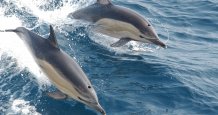
Global study shows how marine species respond as oceans warm
A global analysis of over 300 marine species spanning more than 100 years, shows that mammals, plankton, fish, plants and seabirds have been changing in abundance as our climate warms.

Exeter sea turtle expert on Forbes 30 Under 30 list
A University of Exeter researcher has been chosen for the Forbes “30 Under 30” list of innovators in science and heath across Europe.
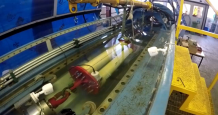
Exeter’s Ocean Technology Group selected to receive Scottish Government support for Floating Offshore Wind innovation
An engineering research team at the University of Exeter’s Offshore Renewable Energy Group will carry out research into innovative mooring systems for floating offshore wind energy applications.
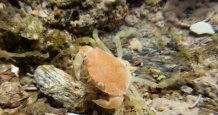
Ship noise hampers crab camouflage
Colour-changing crabs struggle to camouflage themselves when exposed to noise from ships, new research shows.

Ocean changes almost starved life of oxygen
Chemical changes in the oceans more than 800 million years ago almost destroyed the oxygen-rich atmosphere that paved the way for complex life on Earth, new research suggests.
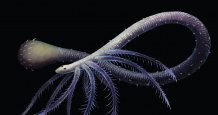
Early worm lost lower limbs for tube-dwelling lifestyle
Scientists have discovered the earliest known example of an animal evolving to lose body parts it no longer needed.
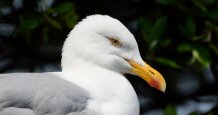
Seagulls favour food humans have handled
Seagulls favour food that has been handled by humans, new research shows.

World-leading plastics research team collect Queen’s Anniversary prize
Prince Charles has awarded the Queen’s Anniversary Prize for Higher Education to a team at the University of Exeter.

Using the power of pop to change minds over sea turtle meat consumption
Researchers have developed a catchy way to reach communities on the island of São Tomé, in West Africa.
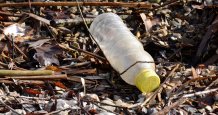
Beach clean data could boost science
Beach cleans can provide vital information on plastic pollution, researchers say.

Turtle tracking reveals key feeding grounds
Loggerhead turtles feed in the same places year after year – meaning key locations should be protected, researchers say.

Arctic sea ice can’t ‘bounce back’
Arctic sea ice cannot “quickly bounce back” if climate change causes it to melt, new research suggests.

Atlantic circulation collapse could cut British crop farming
Crop production in Britain will fall dramatically if climate change causes the collapse of a vital pattern of ocean currents, new research suggests.
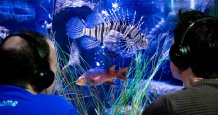
London Aquarium captures rare fish choir sounds in a first for underwater recording
The extraordinary sounds of fish communicating to one another has been captured for the first time in the UK at SEA LIFE London Aquarium.
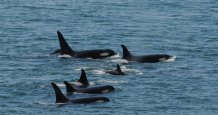
Killer whale grandmothers boost survival of calves
Post-menopausal killer whale grandmothers improve the chances of survival for their calves, new research has found.
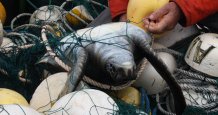
Lights on fishing nets save turtles and dolphins
Placing lights on fishing nets reduces the chances of sea turtles and dolphins being caught by accident, new research shows.
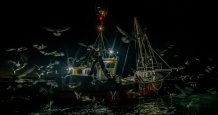
Coastal beauty of Devon and Cornwall shines in photo competition
The beauty of Devon and Cornwall’s coasts and seas has been celebrated with the Exeter Marine photo competition.
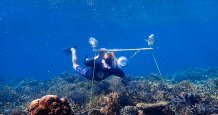
Sounds of the past give new hope for coral reef restoration
Young fish can be drawn to degraded coral reefs by loudspeakers playing the sounds of healthy reefs, according to new research published today in Nature Communications.
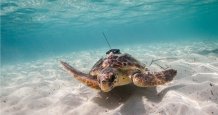
Animals could help humans monitor oceans
Sharks, penguins, turtles and other seagoing species could help humans monitor the oceans by transmitting oceanographic information from electronic tags.
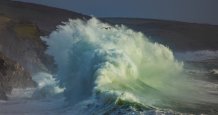
Meeting the challenges facing fisheries climate risk insurance
Insurance schemes with the potential to improve the resilience of global fisheries face a host of future challenges, researchers say.

University experts feature in prestigious ranking of world’s most influential scientists
Leading climate, environment and health academics from the University of Exeter have been recognised as being amongst the world’s most influential researchers, according to a prestigious new ranking.
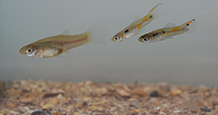
Leadership’s in the blood for tiny fish
Leadership during cooperation runs in the family for tiny fish called Trinidadian guppies, new research shows.
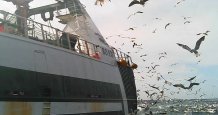
Millions of seabirds rely on discarded fish
Millions of scavenging seabirds survive on fish discarded by North Sea fishing vessels, new research shows.
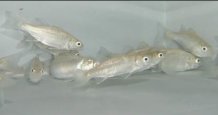
Fish more tolerant than expected to low oxygen events
Fish may be more tolerant than previously thought to periods of low oxygen in the oceans, new research shows.

Exeter experts to play key role in ‘game-changing’ tidal energy project for Channel regions
Renewable Energy experts from the University of Exeter will play a pivotal role in a new “game-changing” tidal energy project, it has been confirmed.
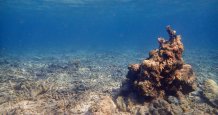
Scientists ‘must be allowed to cry’ about destruction of nature
Scientists witnessing the destruction of the natural world must be supported and “allowed to cry”, researchers say.
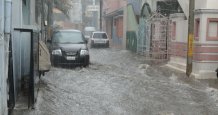
New international project will investigate hidden costs of floods communities
The University of Exeter will lead an international project to investigate the hidden impact of adaptation measures designed to protect flood-prone communities worldwide.
__feat_218x115.jpg)
Basking sharks exhibit different diving behaviour depending on the season, a new study shows
Tracking the world’s second-largest shark species has revealed that it moves to different depths depending on the time of year.

Alumni fund research into mitigating impacts of sport and leisure in the marine environment
Scientists know that light, litter and noise are all major stressors on marine life but we don’t yet have a full understanding of their combined and comparative effects on the environment. However this is set to change thanks to two Exeter alumni.
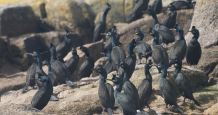
Diving birds follow each other when fishing
Diving seabirds watch each other to work out when to dive, new research shows.
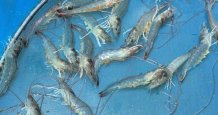
The “pathobiome” – a new understanding of disease
Cefas and University of Exeter scientists have presented a novel concept describing the complex microbial interactions that lead to disease in plants, animals and humans.
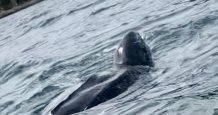
Leatherback turtle spotted off Cornwall
A leatherback turtle has been spotted off the coast of Cornwall – the first confirmed sighting of a live leatherback in UK waters this year.
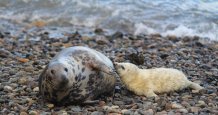
New technique can show links between prey and microplastics
A brand new method has been developed to investigate links between top predator diets and the amount of microplastic they consume through their prey, offering potential insights into the exposure of animals in the ocean and on land to microplastics.
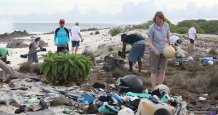
Eden Project event marks massive clean-up of plastic on pristine Indian Ocean atoll of Aldabra
Environmental champions from the Seychelles, Oxford and Cornwall met at the Eden Project to show what the paradise island of Aldabra can teach the world about the scourge of ocean plastic.
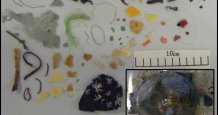
Green turtles eat plastic that looks like their food
Green turtles are more likely to swallow plastic that resembles their natural diet of sea grass, new research suggests.
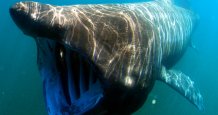
Robot cameras reveal secret lives of basking sharks in UK marine conservation first
An autonomous ‘SharkCam’ has been used in the UK for the first time to observe the behaviour of basking sharks in the Inner Hebrides.
_gull.jpg)
Staring at seagulls could save your chips
Staring at seagulls makes them less likely to steal your food, new research shows.
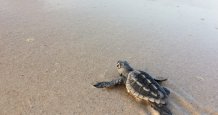
No new males: Climate change threat to Cape Verde turtles
Rising temperatures could mean no male loggerhead turtles hatch at a key breeding ground by the end of this century, new research suggests.
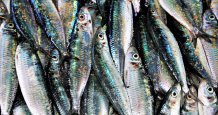
Overfishing plus climate change equals threat to fisheries
Overfishing increases the threat posed by climate change to fish stocks and fisheries, according to a new report for MPs.
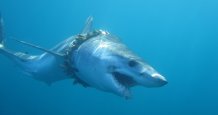
Hundreds of sharks and rays tangled in plastic
Hundreds of sharks and rays have become tangled in plastic waste in the world’s oceans, new research shows.
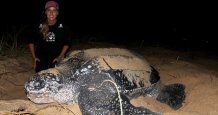
‘Gentle recovery’ of Brazil’s leatherback turtles
Brazil’s leatherback turtles are making a “gentle recovery” after 30 years of conservation efforts, new research shows.

Exeter scientist wins world’s biggest science communication competition
A University of Exeter scientist has won FameLab International, a global competition to find the best new science communicators.
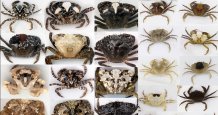
Crabs’ camouflage tricks revealed
Crabs from a single species rely on different camouflage techniques depending on what habitat they live in, new research shows.
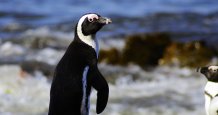
Penguins and their chicks’ responses to local fish numbers informs marine conservation
How adult penguins fish and the body condition of their chicks are directly linked to local fish abundance, and could potentially inform fishery management, a new study has found.
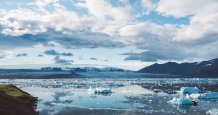
University declares an environment and climate emergency
Exeter has declared an environment and climate emergency to support those calling for urgent action and show commitment to leading the change required.

Exeter experts join Ganges plastic pollution mission
Two University of Exeter scientists will be part of an international team studying plastic pollution in the River Ganges.

Exeter marine expert awarded prestigious medal for scientific contribution
One of the world’s foremost experts in fish ecology and bioacoustics has been awarded a prestigious prize from the Zoological Society of London (ZSL).
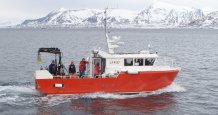
Classrooms invited to join live Arctic adventure
Young people around the world will get the chance to explore the Arctic via live broadcasts from researchers.

Marine conservation scientist wins ZSL award
A scientist who specialises in marine turtle research has won an award from international conservation charity ZSL (Zoological Society of London).
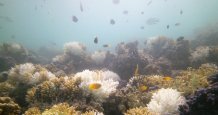
Location, location, location: Proximity to the mainland determines how coral reef communities respond to major environmental disturbances
Severe weather and environmental disturbances, such as cyclones or thermal coral bleaching, affect specific areas of coral reefs differently, new research has shown.
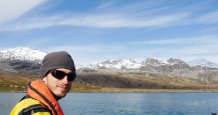
Exeter researcher awarded Pew Fellowship to discover if commercial fishing harms endangered penguin populations
Experts will work to discover if commercial fishing is harming endangered African penguins by making it harder to forage for food in the ocean.

Exeter expert backs calls for bold national Plastic Packaging Plan to help protect oceans
One of the world’s foremost experts in microplastics research has backed calls for a bold new national policy framework to help reduce the amount of ocean plastic pollution.
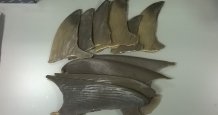
Endangered sharks being eaten in UK
Endangered species of hammerhead and dogfish are among the sharks being sold as food in the UK, researchers have revealed.
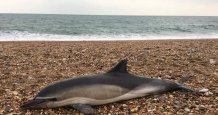
Plastic in Britain’s seals, dolphins and whales
Microplastics have been found in the guts of every marine mammal examined in a new study of animals washed up on Britain’s shores.

Exeter and the Plymouth Marine Laboratory strengthen commitment to world-leading marine science research
Two of the South West’s leading environmental research organisations have strengthened their commitment to collaborating to address some of the key questions facing the sustainable future of the ocean.
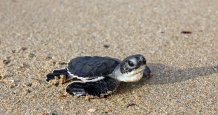
Warming warning over turtle feminisation
Up to 93% of green turtle hatchlings could be female by 2100, as climate change causes “feminisation” of the species, new research suggests.
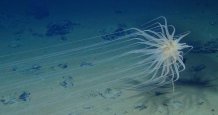
Warning over deep-sea ‘gold rush’
A “gold rush” of seabed mining could lead to unprecedented damage to fragile deep-sea ecosystems, researchers have warned.
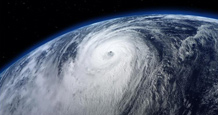
Crucial environmental research receives major funding boost
Pioneering new research on major environmental issues, led by scientists from the University of Exeter, have received a major funding boost, it has been announced.
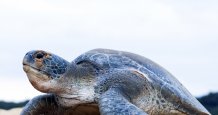
Drones help map sea level rise
Drones can be used to create low-cost and accurate 3D maps of coastal areas, new research shows.

Exeter research ranked among the most influential of 2018
Research conducted by Exeter experts has been recognised amongst the top 100 influential in 2018.

Scientists secure prestigious awards for global impact of microplastics research
A team of researchers has won two prestigious awards for the impact of work highlighting the presence, and potential impacts, of microplastics in our oceans.
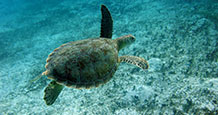
Microplastics found in all sea turtle species
Tests on more than 100 sea turtles – spanning three oceans and all seven species – have revealed microplastics in the guts of every single turtle.

Marine and citizen scientists take to the seas to help secure a future for Atlantic bluefin tuna in UK waters
Cefas and University of Exeter have launched a bluefin tuna tagging programme to try and find out more about the migration patterns of these enigmatic predators.

Exeter expert shortlisted for NERC Impact Awards 2018
4,000 tons of microbeads no longer released into ocean after pioneering plastics research
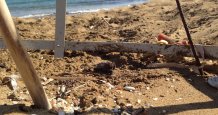
Microplastics found deep in sand where turtles nest
Microplastics have been found deep in the sand on beaches where sea turtles lay their eggs.
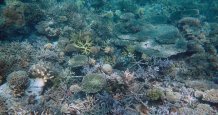
‘Simple solutions’ to help rebuild coral reef ecosystems
The future of coral reefs was discussed at a workshop in Indonesia.
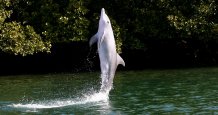
Wild dolphins learn tricks from each other
Dolphins learn tricks from each other in the wild, new research shows.

Discovering why basking sharks go to Scotland
Scientists seeking to discover whether Scotland’s seas are a mating ground for basking sharks have filmed new footage showing the sharks being sociable.
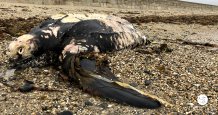
Plastic found in stomach of dead turtle on Cornish beach
Plastic has been discovered in the stomach of a leatherback turtle found dead on a Cornish beach on Sunday.
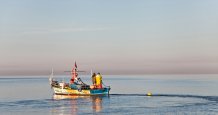
Women in Fisheries website launched
New research exploring women’s roles in fishing families officially gets going this week, as the Women in Fisheries project launches its new website.
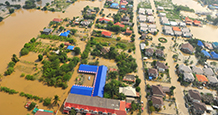
New research show blueprint for El Niño diversity
A pivotal new research study has isolated the key mechanisms that cause El Niño events to differ amongst each other.
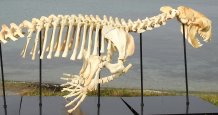
Cornish seal skeleton to go on display
The skeleton of a huge seal that washed up on a Cornish beach will go on display at the University of Exeter on Friday.
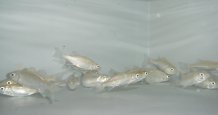
Acidic oceans cause fish to lose their sense of smell
Fish are losing their sense of smell because of increasingly acidic oceans caused by rising levels of carbon dioxide (CO2) in the atmosphere, new research shows.

Exeter subjects ranked in the world top 100
A wide range of subjects at the University of Exeter have been ranked amongst the world’s best, according to an influential international league table.
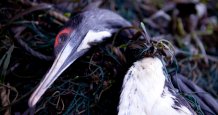
LED lights reduce seabird death toll from fishing by 85 per cent, research shows
Illuminating fishing nets with low-cost lights could reduce the terrible impact they have on seabirds and marine-dwellers by more than 85 per cent, new research has shown.
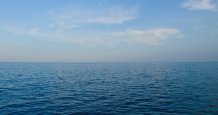
World’s first animals caused global warming
The evolution of Earth’s first animals more than 500 million years ago caused global warming, new research shows.
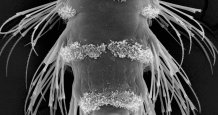
‘The eyes have it’- photoreceptors in marine plankton form a depth gauge to aid survival
The eyes of some marine-dwelling creatures have evolved to act like a “depth gauge”, allowing these creatures to swim in the open ocean at a certain depth .
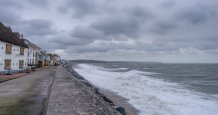
Increase in storms could have ‘catastrophic impact’ on fishing industry
Potential changes in the frequency and intensity of storms off the coast of the UK and around the world could have a “catastrophic impact” on the livelihood of fishermen and sustainability of fishing industries, research led by the University of Exeter has shown.
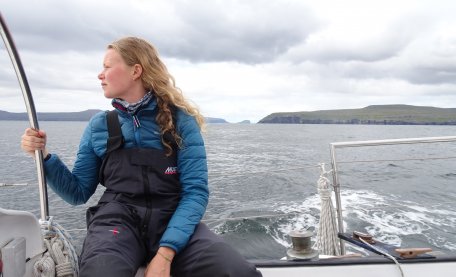
All-female crew set for Pacific plastic pollution voyage
An all-female crew is set to embark on a mission across the Pacific to learn more about plastic pollution.
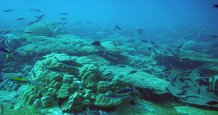
Coral reefs losing ability to keep pace with sea-level rise
Many coral reefs will be unable to keep growing fast enough to keep up with rising sea levels, new research suggests.
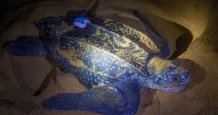
Turtle tagged in Brazil reaches UK territory
A turtle tagged by University of Exeter scientists in Brazil has swum thousands of miles.
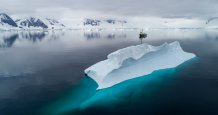
Micro-plastics in the Antarctic
Antarctica’s most remote and pristine habitats are contaminated with micro-plastic waste
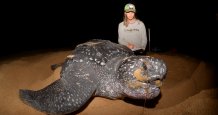
Public invited to quiz sea turtle experts
Top scientists will answer your questions about sea turtles in a live online Q&A on Friday (June 8).
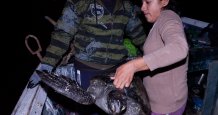
Thousands of turtles netted off South America
Tens of thousands of sea turtles are caught each year by small-scale fishers off South America’s Pacific coast, new research shows.
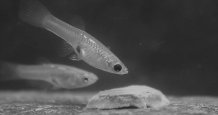
Guppies change their eye colour to deter rivals
Tiny fish called Trinidadian guppies turn their eyes black to warn other fish when they are feeling aggressive, new research shows.
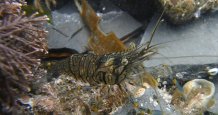
Cautious prawns win battle for food
Prawns have personalities – and cautious crustaceans do better in the battle for food, new research shows.
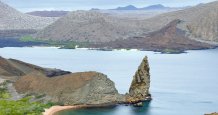
Could Galapagos become plastic pollution free?
There is a growing movement in Galapagos to drastically reduce marine plastic pollution with the aim, one day, of having a plastic-free Galapagos Marine Reserve.

Invisible barrier on ocean surface can reduce carbon uptake
An invisible layer of biological compounds on the sea surface reduces the rate at which carbon dioxide gas moves between the atmosphere and the oceans, scientists have reported.
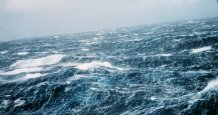
Research sheds new light on understanding Pacific Trade Winds
Pioneering research has given a fascinating new insight into why the Pacific Trade Winds have seen “unprecedented strengthening” over recent decades.
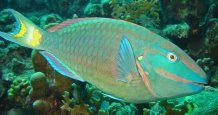
Critical role parrotfish play in coral reef island building shown in stunning new documentary
The pivotal role that parrotfish play in building and maintaining coral reef islands, unearthed by experts at the University of Exeter
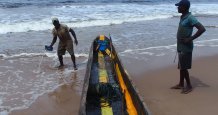
Significant grant will support sustainable fisheries
An important project to protect fish stocks in the Republic of Congo will be able to extend its work thanks to a grant from the Waterloo Foundation.

Guardian award for policy-changing research on microplastic pollution
Research that revealed the devastating impact that microplastic pollution could have on the health of humans and wildlife has won a Guardian University Award.

Exeter student to join team kayaking length of Wales collecting plastic
A second year marine biology student, is to join a team of women kayaking the length of Wales collecting plastic.
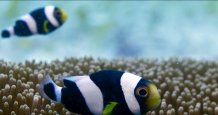
Fish have ears, so man-made noise threatens their survival
An ‘acoustic fog’ from motorboat noise, underwater construction and other man-made marine sounds can threaten the survival of fish.
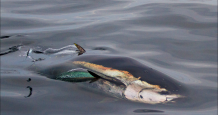
Experts team up to study bluefin tuna and confirm return to UK waters
Atlantic bluefin tuna are known for being amongst the biggest, fastest and most valuable fish in the sea.
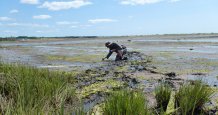
Exeter experts sing praises of glorious mud
Mud provides precious habitats, a buffer against rising sea levels and a host of other benefits, according to two University of Exeter researchers.
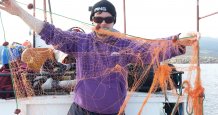
Dolphins tear up nets as fish numbers fall
Fishing nets suffer six times more damage when dolphins are around – and overfishing is forcing dolphins and fishermen ever closer together, new research shows.

All-female crew to sail Pacific on plastics research mission
An all-female crew including sailors, scientists and film-makers will cross the north Pacific later this year to study plastic pollution.
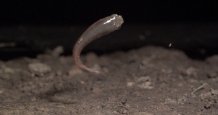
Experience trumps youth among jumping fish
Tiny jumping fish can leap further as they get older, new research shows.
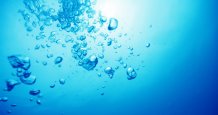
Oxygen loss could be a huge issue for oceans
A major study into an ancient climate change event that affected a significant percentage of Earth’s oceans has brought into sharp focus a lesser-known villain in global warming: oxygen depletion.
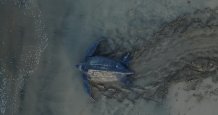
Stunning footage shows how drones can boost turtle conservation
Drones are changing the face of turtle research and conservation, a new study shows.
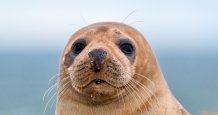
First evidence that marine top predators are exposed to microplastics via their prey
Microplastics can transfer up the food chain from fish to top predators, such as seals, new research shows.
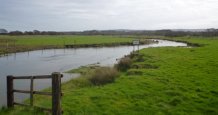
UK chalk-stream salmon genetically unique
Salmon from the chalk streams of southern England are genetically unique, researchers have discovered.
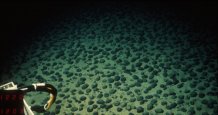
Seabed mining could destroy ecosystems
Mining on the ocean floor could do irreversible damage to deep-sea ecosystems, says a new study of seabed mining proposals around the world.
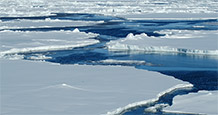
Future Climate Change Revealed by Current Climate Variations
Uncertainty surrounding the extent of future climate change could be dramatically reduced by studying year-on-year global temperature fluctuations, new research has shown.
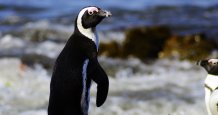
No-fishing zones help endangered penguins
Small no-fishing zones around colonies of African penguins can help this struggling species, new research shows.
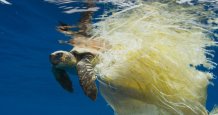
Marine turtles dying after becoming entangled in plastic rubbish
Hundreds of marine turtles die every year after becoming entangled in rubbish in the oceans and on beaches, including plastic ‘six pack’ holders and discarded fishing gear.
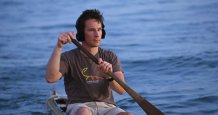
Exeter marine biologist is star of the Blue Planet
Blue Planet II, which has captured the nation’s imagination and highlighted the beauty and plight of marine life around the world, starred the University of Exeter’s Steve Simpson, Associate Professor of Marine Biology & Global Change.

Boost for green research at Exeter
Sustainable seafood and electric cars are among the eco-friendly industries that will be the focus of new research at the University of Exeter.
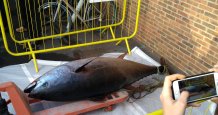
Tuna dissected by university scientists
A tuna accidentally caught off Devon has been dissected by scientists at the University of Exeter.
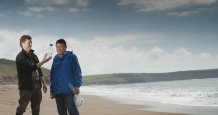
Exeter reports to UN on antibiotic resistance in environment
Antibiotic resistance is one of the greatest health challenges of modern times – and now two world-leading academics have reported to the United Nations on how the problem can be spread through our natural environment.
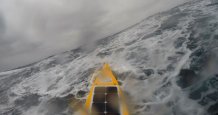
New CO2 device for unmanned ocean vessels
Carbon dioxide in remote parts of the world’s oceans will be measured by a new instrument being developed by scientists.
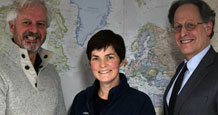
University experts and The Ellen MacArthur Foundation to work towards a circular economy
Experts at the University of Exeter are celebrating a new collaboration with the Ellen MacArthur Foundation as they join its network as a Pioneer University.
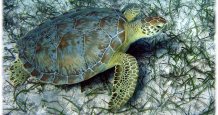
Crime-scene technique used to track turtles
Scientists have used satellite tracking and a crime-scene technique to discover an important feeding ground for green turtles in the Mediterranean.
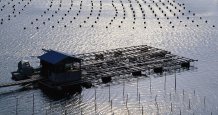
Sustainable seafood top of menu for new research group
A new research group will focus on how seafood can be safely and sustainably produced for the world’s growing population.
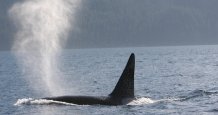
Weak social ties a killer for male whales
Male killer whales are more likely to die if they are not at the centre of their social group, new research suggests.
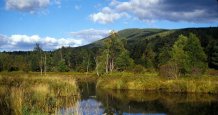
University alliance awarded £2m to train a new generation of freshwater leaders
Exeter is part of the UK’s first freshwater doctoral training programme to address the complex challenges facing freshwater sustainability.
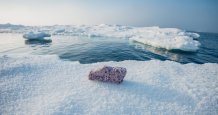
Plastic pollution discovered on ice floes near the North Pole
Melting ice is releasing frozen plastic into the Arctic Ocean, as plastic waste flows towards the Pole.
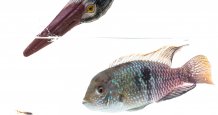
Fish have complex personalities, research shows
Tiny fish called Trinidadian guppies have individual “personalities”, new research shows.
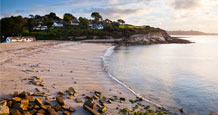
Exeter team brief government on threats to coastal communities
University of Exeter scientists have been commissioned by the Government to write a briefing paper on the health and wellbeing of people living in coastal cities, towns and villages.
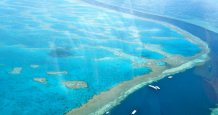
Community support for protection of the Great Barrier Reef
Who cares about the Great Barrier Reef? Many people, according to a paper published in the journal Proceedings of the National Academy of Sciences.

Project develops next generation of offshore renewable energy technology
World-leading researchers from the University of Exeter will collaborate with counterparts in China on a pioneering new project to develop the next generation of offshore renewable energy (ORE) technologies.

Otters learn by copying each other
Otters can learn how to solve puzzles by watching and copying each other, new research shows.
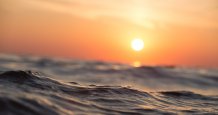
Virus reprogrammes ocean plankton
A virus which infects plankton can reprogramme cells and change the way they absorb nutrients, new research shows.
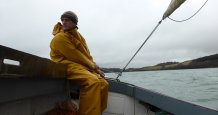
‘Inefficient’ sailing fleet keeps oyster fishery alive
Oyster stocks in a Cornish fishery are sustained thanks to “inefficient” traditional fishing methods, new research suggests.
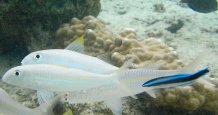
Boat noise disrupts fish co-operation
Noise from motorboats changes the behaviour of cleaner fish and the species they help.
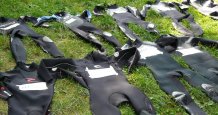
University and leading British surf brand seek wetsuit recycler
A pioneering inventor is being sought to create recycled and recyclable wetsuits.
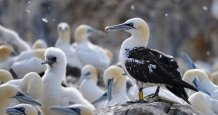
Grown-up gannets find favourite fishing grounds
Like humans, some birds can spend years learning and exploring before developing more settled habits.

Sea temperature changes contributing to droughts
Fluctuations in sea surface temperature are a factor in causing persistent droughts, research suggests.
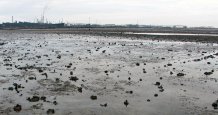
Ancient fish trap gives new clues about history of erosion on Britain’s coastline
An ancient Saxon fishing trap exposed for the first time in centuries thanks to radical environmental change has provided new clues about the history of coastal erosion in Britain.
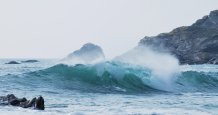
Research looks into whether sea spray is losing its sparkle
Pioneering new research has given a fresh insight into the crucial role that sea spray plays in climate change.
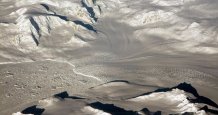
Research reveals West Antarctic Ice Sheet loss over the last 11,000 years
Wind-driven incursions of warm water have forced the retreat of glaciers in West Antarctica over the last millennia, new research has revealed.
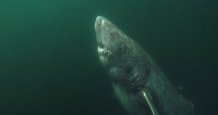
Sharks could hold genetic secret to long life
Greenland sharks, the longest living vertebrate on earth, which are found off the coast of Britain, could hold the secret to long life, geneticists mapping their DNA have predicted.
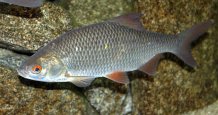
A fifth of male fish in UK rivers now ‘trans-gender’ due to chemicals in human waste
Anti-depressants flushed down the loo reduce natural shyness in fish.
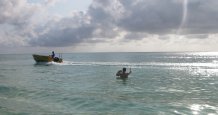
Motor-boat noise makes fish bad parents, leading to the death of their babies
Noise from motorboats is making fish become bad parents, and reducing the chance of their young surviving, research led by marine experts at the University of Exeter has shown.
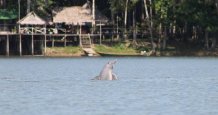
Exeter researchers help protect Peru’s river dolphins
Peru's river dolphins will get new protection thanks to a plan developed with help from the University of Exeter.

Jurassic drop in ocean oxygen lasted a million years
Dramatic drops in oceanic oxygen, which cause mass extinctions of sea life, come to a natural end – but it takes about a million years.
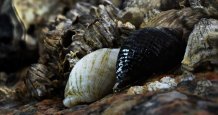
Light pollution has serious impact on coastal wildlife, research shows
Scientists have recognised for some years that light pollution is a growing phenomenon that impacts on the behaviour and success of many animals.
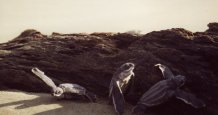
Logging threatens breeding turtles
Debris from logging in tropical forests is threatening the survival of hatchling leatherback turtles and the success of mothers at one of the world’s most important nesting sites in Colombia.
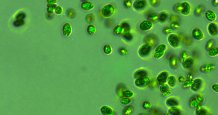
The foundation of aquatic life can rapidly adapt to global warming, new research suggests
Important microscopic creatures which produce half of the oxygen in the atmosphere can rapidly adapt to global warming, new research suggests.
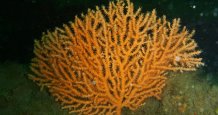
Soft coral species exhibit strikingly different patterns of connectivity around the British Isles
The evolution of land animals has been shaped by barriers such as oceans and mountains which have divided them and sent them down different genetic paths.

European funding launches Marine-i to provide support to marine businesses in Cornwall and the Isles of Scilly
Up to £6.8m of European Regional Development Funding (ERDF) has been secured to develop marine technology research, development and innovation activities in Cornwall and the Isles of Scilly.

Declining Arctic sea ice does influence European weather – but is not a cause of colder winters
The dramatic loss of Arctic sea ice through climate change is unlikely to lead to more severe winter weather across Northern Europe, new research has shown.

Planned protection area would help basking sharks
A proposed Marine Protected Area (MPA) off Scotland’s west coast would help basking sharks, researchers say.
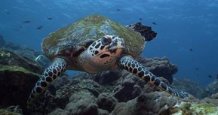
Exeter helps protect Myanmar marine life
A new plan to protect Myanmar’s diverse marine life has been announced.
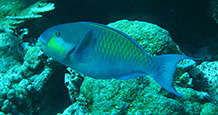
Impacts of mass coral die-off on Indian Ocean reefs revealed
Warming seawaters threaten the stability of tropical coral reefs, with potentially devastating implications for many reef species and the human communities that reefs support.
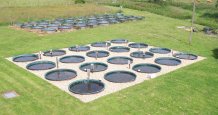
Warming ponds could accelerate climate change
Rising temperatures could accelerate climate change by reducing the amount of carbon dioxide stored in ponds and increasing the methane they release, new research shows.
__feat_218x115.jpg)
Basking sharks seek out winter sun
The winter habits of Britain’s basking sharks have been revealed for the first time.
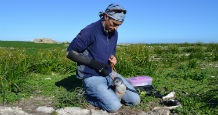
Climate change and fishing create ‘trap’ for penguins
Endangered penguins are foraging for food in the wrong places due to fishing and climate change, research led by the University of Exeter and the University of Cape Town has revealed.
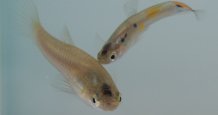
Predator threat boosts friendships among guppies
Danger from predators causes animals to form stronger friendships, according to new research.
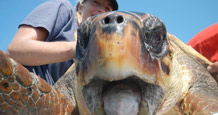
Exeter research helps protect loggerhead turtles
A long-running research and conservation project is helping save an at-risk species of turtle.
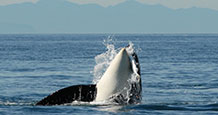
Mother-daughter conflict between killer whales can explain the evolution of menopause
An international research team have found that mother-daughter conflict can explain why killer whales are one of only three known species of mammal, including humans, to go through the menopause.

Exeter’s New Living Systems Institute hosts ‘Global Conversation’
The pioneering and world-leading research conducted at the University of Exeter’s state-of-the-art Living Systems Institute (LSI) will form the basis of the latest high-profile Global Conversation event.

World-leading Ocean Energy Professor receives prestigious international scholarship
One of the world’s leading Renewable Energy experts has received a prestigious international award, in recognition to his ground-breaking research into ocean energy and technology.
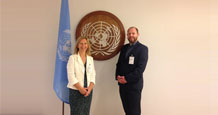
Microplastics’ Impact on Human Health Needs “Urgent Research,” says leading expert
One of the world’s foremost marine pollution experts has welcomed today’s (Monday) announcement that there will be a Government review into the impact of microplastics on human health.
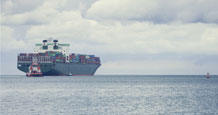
First UK assessment of underwater noise published
The first assessment of underwater noise in the UK marine environment has been carried out by a research partnership including the University of Exeter.
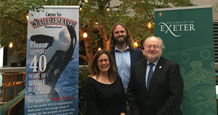
New partnership between Exeter and the Center for Whale Research
The Vice Chancellor met with Professor Darren Croft and Dr Deborah Giles at the Center for Whale Research on San Juan Islands USA to talk about the work they have been doing.
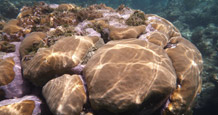
Large-scale study reveals new insights into coral and symbiotic algae partnership
A large-scale study of Caribbean coral has yielded discoveries on the pairing process between an endangered coral and the microscopic symbiotic algae they rely on for survival.
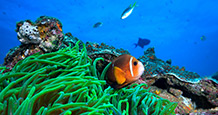
Climate Change Impairs the Survival Instincts of Fish and Can Make Them Swim Towards Predators
Fish farms may hold key to studying the impact of rising CO2 on marine life, and if fish could adapt to climate change.
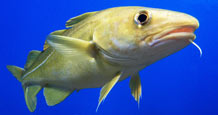
Scientists search for regional accents in cod
Fish may have regional accents and use slightly different “chatter” in different parts of the world.
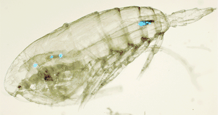
Coastal wildlife more vulnerable to microplastics than expected
Coastal dwelling marine wildlife, including crabs, lobsters and shellfish, which play a crucial role in the food chain, are more vulnerable to harmful plastic pollution than previously expected.
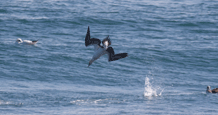
Ocean fronts attract ocean wanderers – foraging gannets on the front line
Foraging seabirds use oceanic fronts as an efficient means to forage for food, according to an international study that could help safeguard the future of protected species.
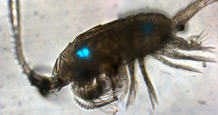
University of Exeter welcomes call for ban on microbeads in cosmetics
A University of Exeter academic has welcomed calls from MPs for a ban on the use of microbeads in cosmetics because of the marine pollution they are causing.
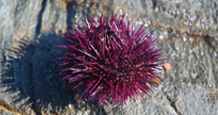
Climate change alters the rules of sperm competition in the sea
The impact of climate change on global seawater conditions could change the rules of sperm competition for many important marine species.

Exeter professor honoured for world-class fish research
A University of Exeter marine biologist has won a prestigious award for his world-class work in the field of fish ecology.
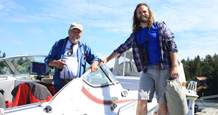
Experts to use drones to discover more about killer whales
Drones will be used to discover more about the social lives of killer whales and help conserve these amazing mammals, which are at risk of extinction.
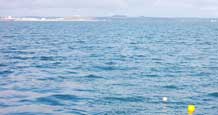
Experts listen in on noisy Falmouth seas
A long-term plan for managing noise in shallow parts of the ocean such as Falmouth Bay is needed to protect the environment, scientists have said.

Exeter expert delivers talk to UN on ocean plastic pollution
A marine pollution expert from the University of Exeter has given a high level presentation at the United Nations headquarters.

New £1M facility to reveal the secrets of marine microbial communities one member at a time
University of Exeter and Plymouth Marine Laboratory have unveiled a state of the art facility for the study of environmental microbes.
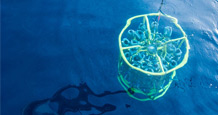
Tiny ocean organism has big role in climate regulation
Scientists have discovered that a tiny, yet plentiful, ocean organism is playing an important role in the regulation of the Earth’s climate.
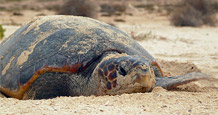
Conservation laws need reshaping to protect sea turtles, research finds
Researchers call for socio-economic influences to be factored into future protection policies
